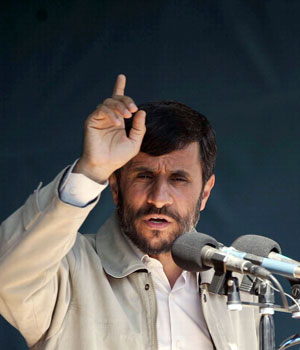
Iran’s president Mahmoud Ahmadinejad, speaks in Roshtkhar during his trip to Khorasan Razavi province 890 km (530 miles) north east of Tehran in Iran, April 12, 2006 (AP)
TEHRAN (AFP) – A defiant Iran vowed to expand its nuclear programme after making a crucial advance in the fuel cycle as the head of the UN’s atomic watchdog Mohamed ElBaradei opened a round of talks with senior Iranian officials.
The International Atomic Energy Agency (IAEA) chief opened his discussions here with Iran’s vice president and Atomic Energy Organisation chief, Gholam Reza Aghazadeh.
He also lined up for talks with Ali Larijani, Iran’s top national security official and nuclear negotiator, before wrapping up the 24-hour visit.
“We hope to convince Iran to take confidence-building measures including suspension of uranium enrichment activities until outstanding issues are clarified,” ElBaradei told journalists upon arrival in Tehran in the early hours of the morning.
“I would like to see Iran has come to terms with the request of the international community,” adding he was “hopeful the time is right for political solutions, through negotiations.”
Russian newspapers Thursday said Iran’s announcement it had successfully enriched uranium showed Tehran had chosen to confront the West and was a cruel rebuff to Moscow.
Tehran “demonstratively gave its negotiating partners a slap in the face,” the opposition daily Kommersant said.
Ahmadinejad’s declaration “is a continuation of the course of provocation towards the West which the president has opted for since the very beginning of his mandate,” the paper added.
With that declaration, the Iranians “took a new step in their war of nerves” with the international community, the centrist daily Izvestia said.
“Tehran’s announcement must be particularly painful to Russia. Indeed the news that it began enrichment on its own in effect puts an end to Russia’s mediation efforts,” Kommersant wrote.
The anouncement “puts an end to recent and seemingly fruitful negotiations aimed at setting up a Russian-Iranian uranium enrichment joint venture on Russian soil,” the government daily Rossiiskaya Gazeta agreed.
Iran was basking in national pride after regime scientists successfully enriched uranium to make nuclear fuel — a milestone in its atomic drive — and officials pledged to move rapidly to industrial-scale work.
The international community united in condemning the move although differences remain over what should happen next, with Washington demanding “strong steps” from the UN Security Council and Russia warning against the use of force.
Representatives of the five permanent members of the Council plus Germany are to meet in Moscow next Tuesday to discuss the crisis, China’s UN envoy said.
ElBaradei must give a report at the end of April on Iran’s nuclear activities to the UN Security Council and the 35 states of the IAEA’s governing council.
The United States accuses Iran of seeking to secretly build nuclear weapons, charges denied by OPEC’s number two oil exporter which insists the drive is aimed purely at electricity generation.
The Security Council has set April 28 as a deadline for Tehran to halt the ultra-sensitive uranium enrichment, a process which can be extended to make the fissile core of a bomb.
Iran’s armed forces joint chief of staff, General Hassan Firouzabadi, was in no mood to back down. “When a people master nuclear technology and nuclear fuel, nothing can be done against them,” he said.
“The West can do nothing and is obliged to extend to us the hand of friendship,” the ISNA news agency quoted Firouzabadi as saying.
US Secretary of State Condoleezza Rice called for the 15-member Security Council to take “strong steps.”
“I do think that the Security Council will need to take into consideration this move by Iran and that it will be time, when it reconvenes on this case, for strong steps to make certain that we maintain the credibility of the international community on this issue,” she said.
The White House said sanctions were now an option.
Officials from permanent Security Council members Britain, France and Russia, and Germany, all said Iran had taken a “step in the wrong direction”.
Russian Foreign Minister Sergei Lavrov was however quoted as strongly opposing the use of force after US reports over the weekend suggested Washington was considering military action — even a possible nuclear strike.
“I am convinced that there can be no resolution of the problem through use of force… practically all European countries are in solidarity with Russia,” he said.
Chinese ambassador Wang Guangya, who chairs the Security Council this month, expressed “concern” at the Iranian announcement but reiterated Beijing’s opposition to sanctions.
Britain described the latest announcement as “deeply unhelpful”.
“I call upon Iran to suspend its activities, begin the process of building confidence, and get back into negotiations,” said Foreign Secretary Jack Straw.
German Foreign Minister Frank-Walter Steinmeier said Iran’s move sent “a very unfriendly signal” and repeated the refrain that Tehran had taken “a step in the wrong direction”.
The French government echoed Germany’s stance.
“These recent declarations are rather a step in the wrong direction,” said government spokesman Jean-Francois Cope.
Israeli military chief of staff General Dan Halutz described a nuclear Iran as “a threat to the whole world and not only Israel”.

International Atomic Energy Agency (IAEA) head Mohamed ElBaradei (L), speaks with Iran’s ambassador to the IAEA, Aliasghar Soltaniyeh, at Tehran’s Mehrabad airport 13 April, 2006 (AFP)

Iranian President Mahmoud Ahmadinejad greets a schoolgirl in Ferdos in Khorasan Razavi province, north east of Tehran, Iran, April 13, 2006 (AP)
